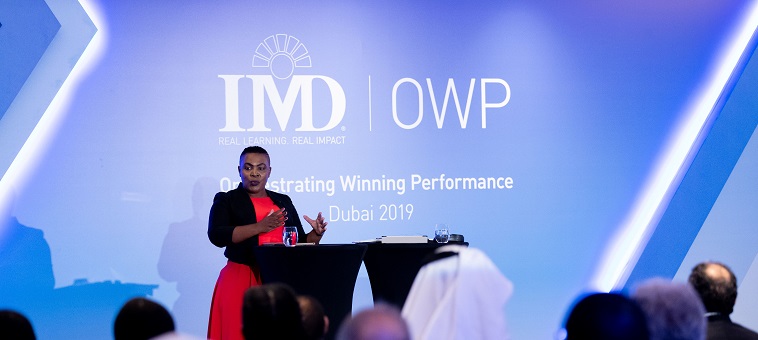As the digital revolution gathers pace, Lindiwe Matlali wants to ensure no child – regardless of skin colour or social background – is left behind.
The founder and CEO of Africa Teen Geeks, Matlali created the organisation to eliminate the barriers faced by disadvantaged communities in pursuing an education in science, technology, engineering and math (STEM).
In a keynote speech on how we can inspire the next generation of innovators, delivered at Orchestrating Winning Performance in Dubai, South African Matlali shared her journey from a childhood living in poverty to one of the leading figures in tech in Africa.
The value of education
It was exposure to education that helped her break from a predestined path, said Matlali.
The youngest of seven, Matlali’s mother died when she was aged four. With no father around, Matlali’s grandparents raised her – and 11 of her siblings and cousins – in a two-bedroom house.
“I was the poster child for poverty and disadvantage,” she said.
It was her grandfather who taught her the value of education and how knowledge can be the pathway out of poverty. This encouragement led her to excel in the classroom, and she graduated from Columbia University in New York before founding tech company Apodytes (she is still the CEO of the company).
Matlali created the coding academy Africa Teen Geeks in 2014 – a job “that feeds the soul” – after meeting an eight-year-old coder who had built her own app in the US.
The meeting inspired her to research the state of computer science education in South Africa – leading to the discovery that IT was only taught from grade 10 and only in affluent schools.
“Every child should have an equal opportunity to get themselves out of poverty. It is very near impossible to break the cycle of poverty … but education is an equaliser.”
She faced a formidable task; research shows that only 13% of children in South African schools will go on to attend university.
How, asks Matlali, can a child in the country compete when many children do not even have the opportunity to learn even basic computing, let alone how to code?
Accessing opportunities
When Matlali first created Africa Teen Geeks, she initially found that few children attended classes, primarily because their parents couldn’t even afford the basic transportation costs.
“When we think about opportunities, we often forget that many people are unable to access opportunities – despite them being there,” she said.
The success of the classes – which are now held at various locations across all nine provinces in South Africa – is already clear to see. Africa Teen Geek students recently competed in a Global Hackathon in the United States, attended by children from Bolivia, Indonesia, and South Africa.
“I am proud to say the South African team won,” said Matlali. “It was the first time they not only went to the US but got on a plane. It was an eye-opener. It changed the way they saw themselves.”
To date, Africa Teen Geeks has reached more than 100,000 South African children.
“We have to equalise education,” said Matlali. “It is the only way to achieve the first UN Sustainable Development Goal by 2020 – to end poverty. I believe we can only do that by democratising education.
“Let’s give every child the gift of a great education.”
Click here to watch the keynote speech of Lindiwe Matlali.



